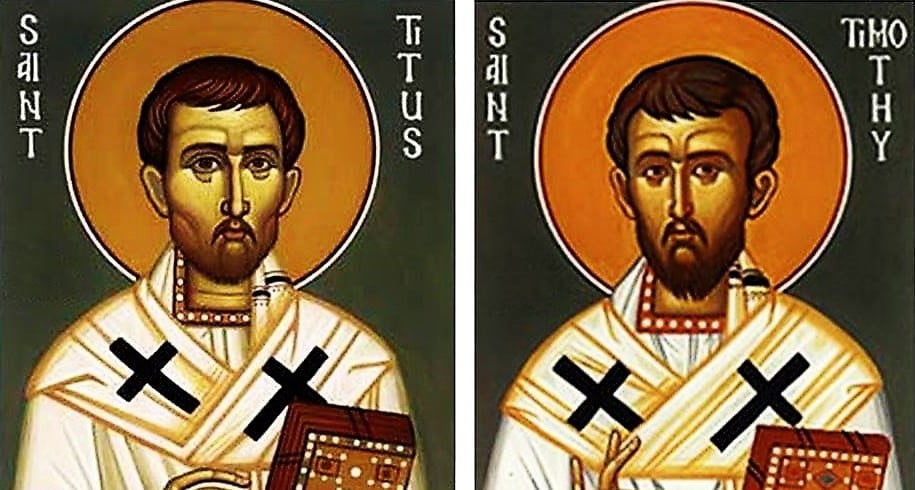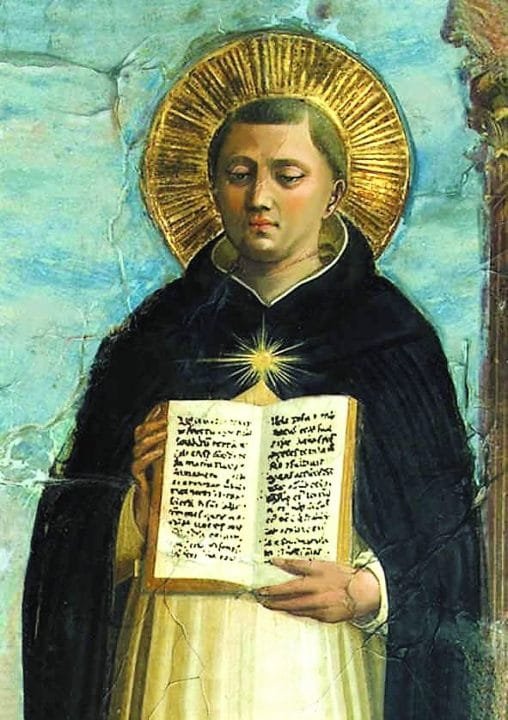26 January
POPE BENEDICT XVI ON SAINTS TIMOTHY AND TITUS, Bishops

Dear Brothers and Sisters,
Having spoken at length on the great Apostle Paul, today let us look at his two closest collaborators: Timothy and Titus. Three Letters traditionally attributed to Paul are addressed to them, two to Timothy and one to Titus.
Timothy is a Greek name which means “one who honors God”. Whereas Luke mentions him six times in the Acts, Paul in his Letters refers to him at least seventeen times (and his name occurs once in the Letter to the Hebrews).
One may deduce from this that Paul held him in high esteem, even if Luke did not consider it worth telling us all about him.
Indeed, the Apostle entrusted Timothy with important missions and saw him almost as an alter ego, as is evident from his great praise of him in his Letter to the Philippians. “I have no one like him (isópsychon) who will be genuinely anxious for your welfare” (2:20).
Timothy was born at Lystra (about two hundred kilometers northwest of Tarsus) of a Jewish mother and a Gentile father (cf. Acts 16:1).
The fact that his mother had contracted a mixed-marriage and did not have her son circumcised suggests that Timothy grew up in a family that was not strictly observant, although it was said that he was acquainted with the Scriptures from childhood (cf. 2 Tm 3:15). The name of his mother, Eunice, has been handed down to us as well as that of his grandmother, Lois (cf. 2 Tm 1:5).
When Paul was passing through Lystra at the beginning of his second missionary journey, he chose Timothy to be his companion because “he was well spoken of by the brethren at Lystra and Iconium” (Acts 16:2), but he had him circumcised “because of the Jews that were in those places” (Acts 16:3).
Together with Paul and Silas, Timothy crossed Asia Minor as far as Troy, from where he entered Macedonia. We are informed further that at Philippi, where Paul and Silas were falsely accused of disturbing public order and thrown into prison for having exposed the exploitation of a young girl who was a soothsayer by several unscrupulous individuals (cf. Acts 16:16-40), Timothy was spared.
When Paul was then obliged to proceed to Athens, Timothy joined him in that city and from it was sent out to the young Church of Thessalonica to obtain news about her and to strengthen her in the faith (cf. 1 Thes 3:1-2). He then met up with the Apostle in Corinth, bringing him good news about the Thessalonians and working with him to evangelize that city (cf. 2 Cor 1:19).
We find Timothy at Ephesus during Paul’s third missionary journey. It was probably from there that the Apostle wrote to Philemon and to the Philippians; he sent both Letters jointly with Timothy (cf. Phlm 1; Phil 1:1).
From Ephesus, Paul sent Timothy to Macedonia, together with a certain Erastus (cf. Acts 19:22), and then also to Corinth with the mission of taking a letter to the Corinthians, in which he recommended that they welcome him warmly (cf. 1 Cor 4:17; 16:10-11).
We encounter him again as the joint sender of the Second Letter to the Corinthians, and when Paul wrote the Letter to the Romans from Corinth he added Timothy’s greetings as well as the greetings of the others (cf. Rom 16:21).
From Corinth, the disciple left for Troy on the Asian coast of the Aegean See and there awaited the Apostle, who was bound for Jerusalem at the end of his third missionary journey (cf. Acts 20:4).
From that moment in Timothy’s biography, the ancient sources mention nothing further to us, except for a reference in the Letter to the Hebrews which says: “You should understand that our brother Timothy has been released, with whom I shall see you if he comes soon” (13:23).
To conclude, we can say that the figure of Timothy stands out as a very important pastor. According to the later Ecclesiastical History by Eusebius, Timothy was the first Bishop of Ephesus (cf. Hist. eccles., III, 4). Some of his relics, brought from Constantinople, were found in Italy in 1239 in the Cathedral of Termoli in the Molise.
Then, as regards the figure of Titus, whose name is of Latin origin, we know that he was Greek by birth, that is, a pagan (cf. Gal 2:3). Paul took Titus with him to Jerusalem for the so-called Apostolic Council, where the preaching of the Gospel to the Gentiles that freed them from the constraints of Mosaic Law was solemnly accepted.
In the Letter addressed to Titus, the Apostle praised him and described him as his “true child in a common faith” (Ti 1:4). After Timothy’s departure from Corinth, Paul sent Titus there with the task of bringing that unmanageable community to obedience.
Titus restored peace between the Church of Corinth and the Apostle, who wrote to this Church in these terms: “But God, who comforts the downcast, comforted us by the coming of Titus, and not only by his coming but also by the comfort with which he was comforted in you, as he told us of your longing, your mourning, your zeal for me. . . . And besides our own comfort we rejoiced still more at the joy of Titus, because his mind has been set at rest by you all” (2 Cor 7:6-7, 13).
From Corinth, Titus was again sent out by Paul—who called him “my partner and fellow worker in your service” (2 Cor 8:23)—to organize the final collections for the Christians of Jerusalem (cf. 2 Cor 8:6). Further information from the Pastoral Letters describes him as Bishop of Crete (cf. Ti 1:5), from which, at Paul’s invitation, he joined the Apostle at Nicopolis in Epirus (cf. Ti 3:12). Later, he also went to Dalmatia (cf. 2 Tm 4:10). We lack any further information on the subsequent movements of Titus or on his death.
To conclude, if we consider together the two figures of Timothy and Titus, we are aware of certain very significant facts. The most important one is that in carrying out his missions, Paul availed himself of collaborators. He certainly remains the Apostle par excellence, founder and pastor of many Churches.
Yet it clearly appears that he did not do everything on his own but relied on trustworthy people who shared in his endeavors and responsibilities.
Another observation concerns the willingness of these collaborators. The sources concerning Timothy and Titus highlight their readiness to take on various offices that also often consisted in representing Paul in circumstances far from easy. In a word, they teach us to serve the Gospel with generosity, realizing that this also entails a service to the Church herself.
Lastly, let us follow the recommendation that the Apostle Paul makes to Titus in the Letter addressed to him: “I desire you to insist on these things, so that those who have believed in God may be careful to apply themselves to good deeds; these are excellent and profitable to men” (Ti 3:8).
Through our commitment in practice we can and must discover the truth of these words, and precisely in this Season of Advent, we too can be rich in good deeds and thus open the doors of the world to Christ, our Savior.
SOURCE: http://www.vatican.va/content/benedict-xvi/en/audiences/2006/documents/hf_ben-xvi_aud_20061213.html
EMPHASIS MINE.
O God, who adorned Saints Timothy and Titus with apostolic virtues, grant, through the intercession of them both, that, living justly and devoutly in this present age, we may merit to reach our heavenly homeland. Through our Lord.
Collect, Mass proper
Stay updated: subscribe by email for free TO OUR NEW WEBSITE www.catholicsstrivingforholiness.org (PUT YOUR EMAIL IN THE SUBSCRIBE WIDGET).
We are also in www.fb.com/Catholicsstrivingforholiness. Kindly help more people in their Christian life by liking our page and inviting your family, friends and relatives to do so as well. Thanks in advance and God bless you and your loved ones! Fr. Rolly Arjonillo


